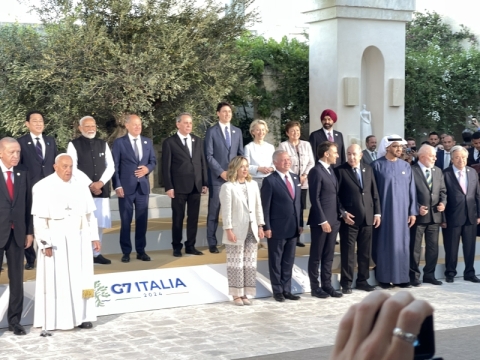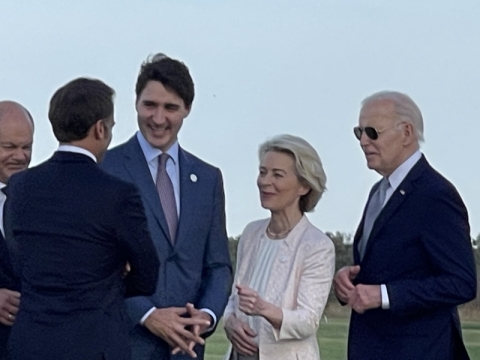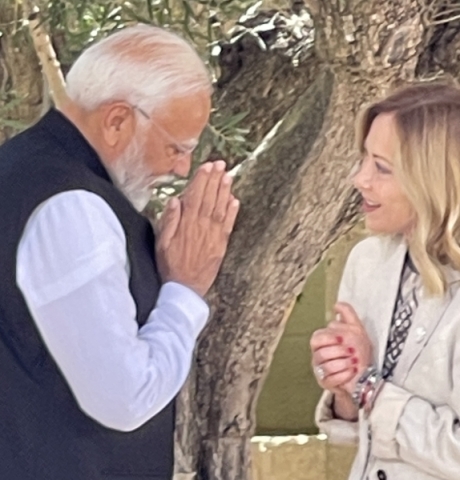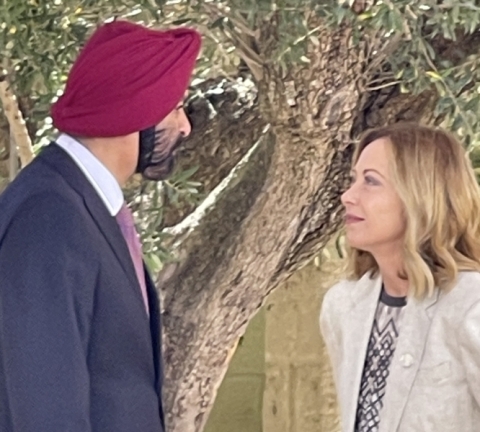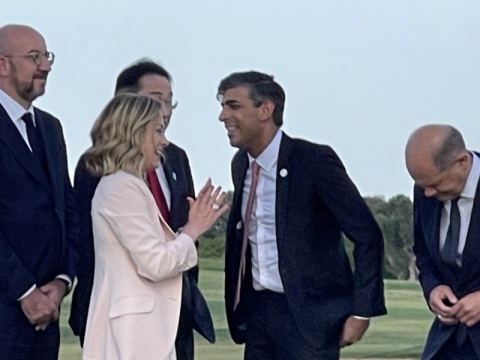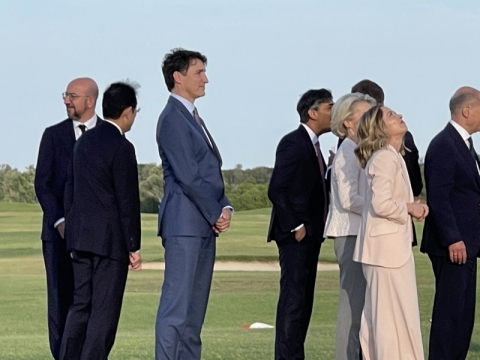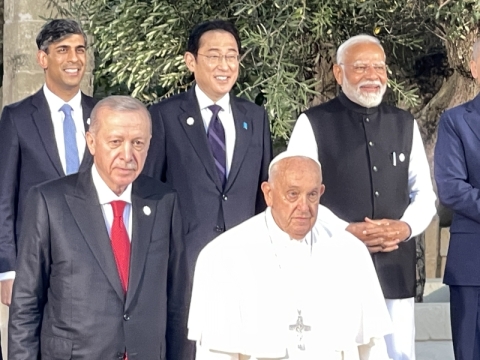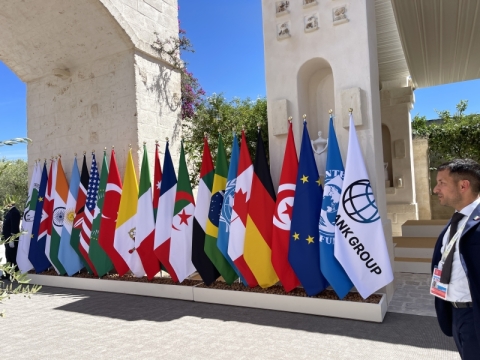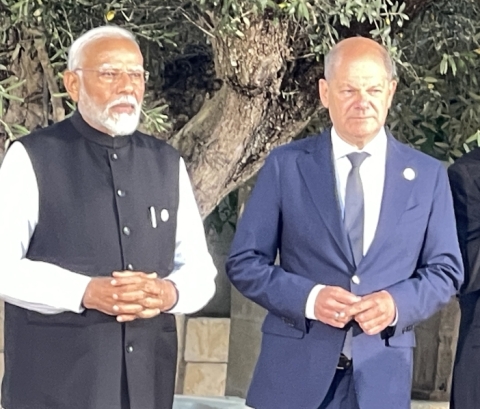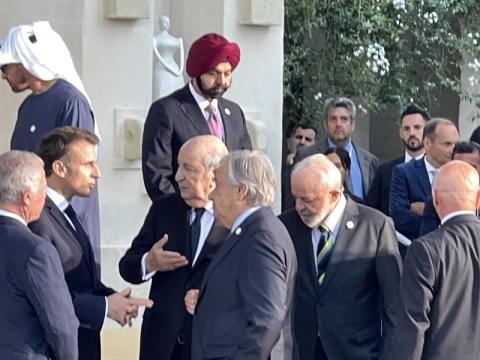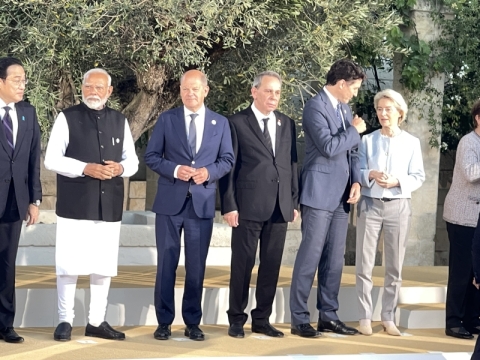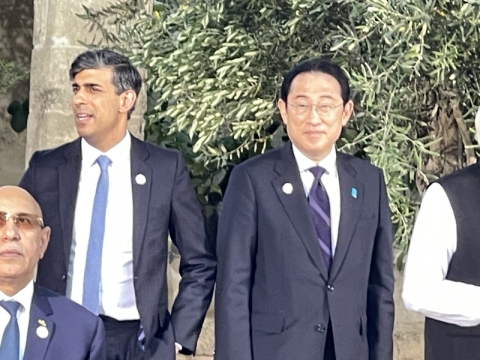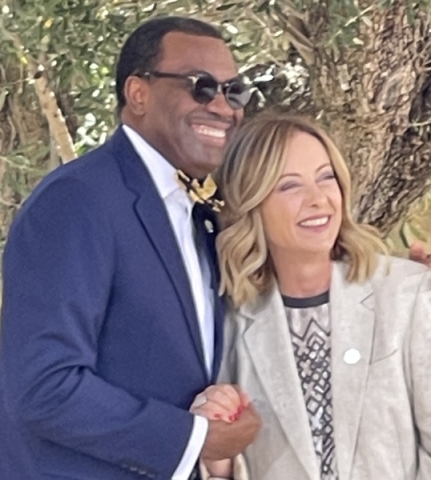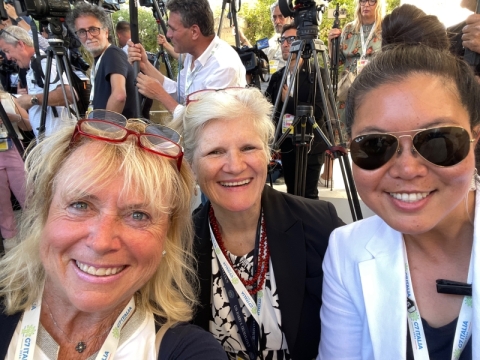Politics
A WORLD ON THE EDGE
HIGH STAKES SUMMITS: G7 AND NATO

G7 2024 Puglia, Italy (Source: Ina Von Ber)
USPA NEWS -
With the G7 Summit in the picturesque, serene, uniquely aesthetic, architecturally beautiful, calm, and sophisticated Borgo Egnazia in Puglia, Italy in the rearview mirror, all eyes are on the trepidant, frantic, turbulent, and historic Washington D.C., where the 75th NATO Summit starts tomorrow. Thirty-two world leaders, along with many senior officials, foreign ministers, defense ministers, and cabinet officials from NATO partners, will return to the birthplace of one of the most powerful international alliances to celebrate its 75th anniversary.
This bittersweet celebration takes place at a time when Europe is shaken by war, the world is experiencing persistent cyberattacks from state and non-state actors targeting global, critical infrastructure, and rising tensions with countries such as China and Russia are impacting international stability and transatlantic security. These issues are compounded by concerns over nuclear capabilities, the risk of proliferation in regions like North Korea and Iran, the development of advanced weaponry, and the deployment of AI, hypersonic missiles, and other advanced military technologies by adversaries of democratic regimes.
NATO partners, which include Australia, Japan, New Zealand, the Republic of Korea, the European Union, and Ukraine, are meeting amidst eminent threats to space security, satellite communications, space-based assets, increased disinformation, foreign propaganda, and misinformation campaigns affecting public opinion and democracy.
Global supply chain vulnerabilities, disruptions due to global pandemics, geopolitical tensions, and reliance on critical external supplies, coupled with climate-induced crises, are causing increasing instability and resource scarcity, leading to potential conflicts.
Advanced, collective initiatives to strengthen the rules-based international order and deepen cooperation within the Alliance are imperative at this point and needed sooner rather than later. The silver lining, partly due to President Joe Biden’s commitment, efforts, and investment in strengthening the Alliance and forming partnerships around the world, is that NATO is larger, stronger, better resourced, and more united than ever before. It has expanded to include strategic members Finland and Sweden. This marks a pivotal moment for international cooperation, as NATO will pick up pressing global issues tomorrow where the 50th G7 Summit left off.
The G7 agenda was packed with intense political discussions that emphasized collaborative strategies to strengthen the global economy amid rising geopolitical tensions, ranging from economic recovery post-COVID-19 to the climate crisis.
World leaders tackled pressing challenges such as inflation, debated the merits of enforcing a global minimum corporate tax rate, agreed on measures to support sustainable growth, proposed a framework to enhance international trade and prevent supply chain disruptions, and committed to equitable policies that support vulnerable populations.
The world's most advanced economies focused on collaborative economic revitalization plans, global military support, artificial intelligence, economic reforms, financial aid, agricultural assistance, sanctions, and diplomatic measures. One of the many highlights was the commitment to accelerate vaccine distribution to developing countries and the pursuit of equitable global health solutions, showcasing a united front in tackling the ongoing public health crisis. Key discussions centered around economic recovery post-pandemic, climate change initiatives, the implementation of stricter climate policies, and the commitment of leading nations to achieving net-zero emissions.
There was a distinct emphasis on the importance of solidarity and multilateral cooperation and acknowledgment of the interconnected nature of today's global issues, albeit peppered with moments of diplomatic tension, was evident. Several bilateral meetings and informal conversations played a critical role in bridging gaps and forging stronger agreements.
Ukraine’s ongoing conflict and humanitarian crisis took center stage during the G7 discussions. Leaders, with Italian Prime Minister Giorgia Meloni at the forefront, reaffirmed their unwavering support for Ukraine’s sovereignty and territorial integrity. A comprehensive aid package, including economic assistance and military support, was pledged to help Ukraine withstand aggression and rebuild its economy. The G7 countries committed a combined total of $20 billion in direct financial aid to stabilize Ukraine's economy. This includes grants and low-interest loans to support government operations, social services, and infrastructure restoration.
Economic reforms, in collaboration with international financial institutions like the International
Monetary Fund (IMF) and the World Bank, will provide technical assistance to help Ukraine implement critical economic reforms to enhance transparency, combat corruption, and improve the business climate to attract foreign investment.
Sanctions against Russia were also tightened, further isolating its economy by targeting key sectors like finance, energy, and defense. These measures aim to pressure a cessation of hostilities and send a clear message of international solidarity. Recognizing Ukraine's significant role as a global grain supplier, the G7 will offer support to rebuild the country's agricultural sector. This includes funding for farm equipment, seeds, fertilizers, and logistics to restore agricultural productivity and export capacity.
The responsibility of AI in shaping the future was another hot topic at the summit. Leaders acknowledged the transformative potential of AI in various sectors, including healthcare, finance, and transportation.However, they also recognized the ethical implications, pointing out such risks as the potential impacts on labor markets, machines taking the place of human workers, and the justice system using algorithms to predict recidivism. To address these, participants agreed to establish a joint AI Ethics Board focused on creating robust frameworks for AI development, ensuring it benefits humanity without infringing on rights and privacy.
Serving as a diplomatic intermediary, Pope Francis joined a chorus of countries pushing for stronger guardrails on AI following the boom in generative AI kickstarted by OpenAI’s ChatGPT chatbot, among others. The Pontiff called for peaceful resolutions, humanitarian efforts, social justice, and environmental stewardship, encouraging leaders to adopt more ethical policies. While the Pope’s involvement is rather indirect, his statements can mobilize public sentiment, reinforce democratic values, and solidify the unity and resolve of NATO members, pot
On the weapons issue, the G7 leaders said they recognized the impact of AI in the military domain “and the need for a framework for responsible development and use.” They encouraged states to ensure “military use of AI is responsible, complies with applicable international law, particularly international humanitarian law, and enhances international security." Moreover, leaders addressed ongoing security threats and geopolitical challenges, particularly in relation to Russia and China, emphasizing the need for a united front to counteract coercive economic practices and uphold democratic values, reinforcing their collective stance on upholding international law and supporting nations under duress from external pressures.
Addressing climate change, the G7 reaffirmed their commitment to the 1.5-degree Celsius limit, underscored their commitment to achieving net-zero emissions by 2050, and agreed on new strategies to reduce greenhouse gas emissions. Participants rallied behind the urgency of the climate crisis, agreeing to enhance their national climate action plans significantly. The G7 addressed the security implications of climate change, noting risks such as resource scarcity leading to conflict. Additionally, discussions included financial support for developing countries to help them transition to greener economies, the necessity of implementing robust climate policies, and investing in green technologies. This reinforced the G7's role in leading global efforts toward a more sustainable and resilient future.
SECURITY
Both forums emphasize the importance of strong cyber defense mechanisms, call for robust measures to counteract malicious information tactics, and recognize the strategic importance of safe and secure space environments. The G7's unified stance on cybersecurity enhancements will strengthen NATO's cyber defense strategies, foster the integration of cybersecurity protocols, and promote collaborative cyber defense operations. This will fortify NATO's defenses against cyber threats, build resilience and develop extensive cybersecurity measures. Enhanced cooperation in technology is expected to lead to advancements in military technology, communications, and cybersecurity. G7 leaders are committed to fostering technological advancements, supporting small and medium-sized enterprises (SMEs) to rejuvenate the post-pandemic economy, highlighting the need for enhanced international cooperation to defend against cyberattacks, and underscoring the importance of joint efforts to disrupt terrorist networks, share intelligence, and develop collaborative strategies. The G7 acknowledged the threat of disinformation to democratic institutions
Both forums emphasize the importance of strong cyber defense mechanisms, call for robust measures to counteract malicious information tactics, and recognize the strategic importance of safe and secure space environments. The G7's unified stance on cybersecurity enhancements will strengthen NATO's cyber defense strategies, foster the integration of cybersecurity protocols, and promote collaborative cyber defense operations. This will fortify NATO's defenses against cyber threats, build resilience and develop extensive cybersecurity measures. Enhanced cooperation in technology is expected to lead to advancements in military technology, communications, and cybersecurity. G7 leaders are committed to fostering technological advancements, supporting small and medium-sized enterprises (SMEs) to rejuvenate the post-pandemic economy, highlighting the need for enhanced international cooperation to defend against cyberattacks, and underscoring the importance of joint efforts to disrupt terrorist networks, share intelligence, and develop collaborative strategies. The G7 acknowledged the threat of disinformation to democratic institutions
CHINA AND RUSSIA
Both forums highlight the need for a unified stance against adversarial maneuvers. Persistent diplomatic efforts will accompany the aid package for Ukraine, aiming to engage with international and regional organizations to find a peaceful resolution to the conflict. The package includes an array of defensive military equipment, such as anti-aircraft systems, anti-tank weaponry, and surveillance drones, to bolster Ukraine's defensive capabilities.
This aims to enhance the country's ability to protect its sovereignty against external aggression. G7 noted the strategic challenges posed by the assertive actions of countries like China and Russia. NATO will delve deeper into the military aspects of this competition and discuss further steps to assist Ukraine’s defense capabilities and sovereignty. A second challenge for NATO will be formulating a joint strategy for Indo-Pacific security and defense cooperation.
Both forums highlight the need for a unified stance against adversarial maneuvers. Persistent diplomatic efforts will accompany the aid package for Ukraine, aiming to engage with international and regional organizations to find a peaceful resolution to the conflict. The package includes an array of defensive military equipment, such as anti-aircraft systems, anti-tank weaponry, and surveillance drones, to bolster Ukraine's defensive capabilities.
This aims to enhance the country's ability to protect its sovereignty against external aggression. G7 noted the strategic challenges posed by the assertive actions of countries like China and Russia. NATO will delve deeper into the military aspects of this competition and discuss further steps to assist Ukraine’s defense capabilities and sovereignty. A second challenge for NATO will be formulating a joint strategy for Indo-Pacific security and defense cooperation.
ECONOMIC RESILIENCE
Both summits stress the necessity of strong, resilient economies to sustain security commitments. Strengthened supply chains will ensure reliable equipment and resources for NATO operations. The allocation of increased funds for defense initiatives and capacity building will reinforce shared financial commitments, invigorating NATO’s collective defense funding. Consistent military spending among G7 members could ensure sustained NATO capabilities and readiness. Commitment to maintaining free and open trade routes would protect vital sea lanes, maritime security, and strategy as well as naval cooperation. NATO will discuss how economic vulnerabilities can undermine defense capabilities and will examine these impacts on defense logistics and operations.
Both summits stress the necessity of strong, resilient economies to sustain security commitments. Strengthened supply chains will ensure reliable equipment and resources for NATO operations. The allocation of increased funds for defense initiatives and capacity building will reinforce shared financial commitments, invigorating NATO’s collective defense funding. Consistent military spending among G7 members could ensure sustained NATO capabilities and readiness. Commitment to maintaining free and open trade routes would protect vital sea lanes, maritime security, and strategy as well as naval cooperation. NATO will discuss how economic vulnerabilities can undermine defense capabilities and will examine these impacts on defense logistics and operations.
NUCLEAR NON-PROLIFERATION
Both gatherings emphasize diplomatic and defense measures to handle nuclear risks. NATO must align military strategy with G7 economic sanctions. NATO’s role in countering influence in the Indo-Pacific region needs to be examined, and maritime defense strategies to safeguard trade routes should be enforced. Technological innovations, collaborations, and partnerships of the G7 will enhance NATO’s collaboration on emerging technologies like AI and quantum computing, maintaining a technological edge and advancing defense systems.
The G7 summit concluded with significant advancements in key areas: support for Ukraine, the impact of artificial intelligence (AI), and the contributions of Pope Francis. These outcomes will likely bolster NATO’s strategic, technological, and ethical frameworks, with AI playing a transformative role in national security. While the G7 reaffirmed their commitment to preventing the spread of nuclear weapons, NATO will need to develop strategies to bolster non-proliferation efforts and manage existing threats.
more information: https://https://www.ambassadorialroundtable.org
Liability for this article lies with the author, who also holds the copyright. Editorial content from USPA may be quoted on other websites as long as the quote comprises no more than 5% of the entire text, is marked as such and the source is named (via hyperlink).

